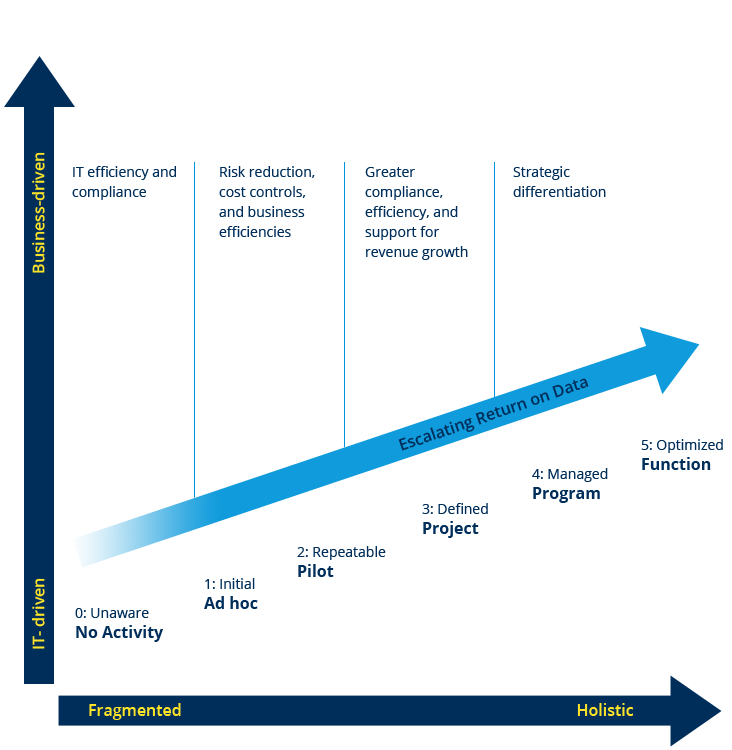
Data Governance
We see the term Data Governance been thrown around like its candy. But what exactly is Data Governance? How does one define it?
ALL ORGANIZATIONS agree that Data be it customer, market, employee, competition, etc. is the single most underutilized asset there is. Moreoever this is the only asset that actually increases in value the more you use it.
Data Governance is a set or processes that ensures efficient and profitable management of this hitherto ignored asset. Data Governance ensures trustworthy data and it makes people accountable for it.
What is Data Governance
- A set of processes that ensures that important data assets are formally managed throughout the enterprise.
- Ensures that data can be trusted and that people can be made accountable for any adverse event that happens because of low data quality.
- It is about putting people in charge of fixing and preventing issues with data so that the enterprise can become more efficient.
- Describes an evolutionary process for a company, altering the company’s way of thinking and setting up the processes to handle information so that it may be utilized by the entire organization.

Levels of Data Governance Maturity
- Determining an organization’s current level of data governance maturity is a necessary first step in developing a customized plan that is both relevant and executable.
- Softpath draws on the Capability Maturity Model Integration (CMMI) process improvement approach to define six broad stages of maturity.
Four characteristics define the maturity level of an organization:
Leadership :
From bottom-up grassroots efforts in Stage 1 to top-down executive-level leadership in Stage 5
Scope :
From an ad hoc, siloed focus in Stage 1 to a self-sustaining core business function in Stage 5
Measurement / Metrics :
From tactical technology metrics in Stage 1 to enterprise-wide, total impact to the business in Stage 5
Data Governance Management :
From ad hoc exception-based management of the data governance effort itself in Stage 1 to management as a self-sustaining business function in Stage 5
Enable Proactive Master Data Governance with Informatica MDM
Implement a Collaborative Approach to Data Governance
The data governance capability of Informatica MDM technology enables master data solutions that are effective for every stakeholder in the data governance equation: business users, data stewards, and IT managers.
Informatica MDM features a Web-based, intuitive, and easy-to-use interface that gives users the ability to create, consume, manage, and monitor master data more effectively than ever before.
Informatica MDM’s native workflow capability enables business users to collaboratively create data directly within the MDM product interface and govern the approval process. It also enables business users to immediately consume reliable data directly to perform their jobs.
Informatica MDM has a powerful task-oriented user interface that improves data steward productivity by simplifying the daily management of repetitive tasks and enabling close monitoring of data quality.
IT can rapidly deploy and configure Informatica MDM for immediate use by the business community and then continue to adapt it to ever-changing business requirements.
Increase Business Adoption of Master Data
By increasing business adoption of master data solutions, Informatica MDM delivers immediate efficiencies within business functions.
It improves the productivity of the business by helping it find accurate information faster, and it also enables more effective compliance initiatives by providing a complete and consistent view of the data, its history, and its lineage.
Organizations can reduce the cost of maintaining data quality with Informatica MDM because it enables proactive data management by data stewards.
In addition, Informatica MDM benefits decision makers in the IT department because it eliminates the cost and risk of developing and maintaining its own user interface while enabling IT to increase its responsiveness to new business needs.
Services
Quick links
Quick Contact
- Get In Touch With FPM Technologies At
- 201-301-0741
- 201-301-0741
- sales@fpmtechnologies.com
